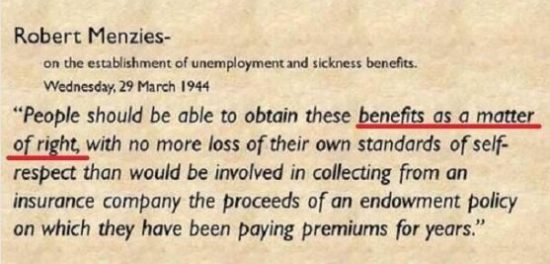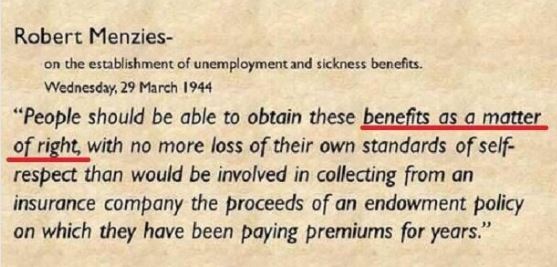Welfare Reform: Turnbull is No Menzies

Turnbull’s claim that the Turnbull Liberal Party is a party embracing Menzies Liberalism, is a self-delusional fallacy. In terms of progressive welfare reform, the Menzies Liberal is dead.
The neo-liberal/conservative successors of Menzies are the insidious pathogen that flows through the Liberal party’s veins to sustain its current mutant form. Menzies views on social security and Turnbull’s stigmatising and punitive approach are poles apart.
Deviants and Outsiders
Since the 1990s The Liberal Party of Australia has embraced the Thatcherist concepts of framing the jobless as ‘deviants and outsiders.’ Increasing punitive measures imposed upon the jobless has existed since Howard. Howard embraced Thatcherism and punitive measures have spiralled out of control since then, with each successive Liberal Government. Turnbull’s Welfare Reform Bill, currently before Senate Committee is increasingly worse and is no exception.
I will use Adam’s Equity Theory to explain how those who embrace the tenets of Thatcherism, encourage societal divide, anger and acceptance of punitive welfare.
Equity theory
Equity Theory is based on the logic that humans will make social comparison’s between themselves and others. In doing so they assess effort exerted for reward gained.
Social division is created through the use of negative narrative. Categorisations such as ‘bludgers, loafers, lazy and more recently ‘the taxed not’, forces humans to make a comparison with others. To determine if one is in the ‘in-group or the ‘out-group’ is a natural reaction.
Therefore, they encourage the public to actively compare their personal input into society against those on welfare. Is their personal effort (work) for reward (income) equal with those who receive financial ‘reward’ for no effort?
A stigmatising narrative drives the view that reward is equal. When in reality it is not.
The first Thatcher government was able to launch an anti-welfare campaign by tapping into deep-seated resentment of `something for nothing’ welfare beneficiaries, to especial effect when it could be suggested that those in receipt of the state’s generosity were largely `outsiders’ (Phillip M. Larkin)
Enabling An Angry Society
Equity theory is a motivational theory. However, it also belongs to the grouping of justice theories. This is because the construct of justice underpins the motivational factors and behavioural response.
How an individual perceives distributive justice shapes our culture. This sets down the parameters of the socially acceptable response to express anger at unfairness.
For example, union activism is (largely) a socially acceptable way to express anger and protest unfair work laws. The behavioural response is anger. The motivator is to achieve equality for those worse off.
Manufactured Unfairness
In the context of welfare, the perception of unfairness through the lens of distributive justice is manufactured by those in power who have an inherent dislike for those on welfare.
The use of a negative stigmatising narrative creates this enabling environment. The perception that those on welfare receive an equal reward for no effort is championed by influential politicians and political commentators. Therefore, this creates an enabling environment for the public to express anger towards those on welfare.
In the seminal research of distributive justice and relative deprivation, the connection between perceived injustice and aggression is clearly evident. If a state of injustice exists and it is to a person’s disadvantage – that is they person experiences deprivation – he or she will display anger. (Einarsen et. al)
However, in the instance of manufactured unfairness, deprivation is a subjective perception.
In this instance, the collective views those on welfare as ‘better off’ (as they expel less effort for the perceived ‘same’ reward). Therefore, the collective considers their situation as ‘worse off’ and unfair (deprivation).
As Newstart is 20% below the poverty line, in reality, this is clearly not the case. However, the negative narrative and the layering of punitive welfare measures over time, masks this.
Punitive Measures Creep
In contrast to the union activism example above, the collective’s behavioural response is largely influenced by what I term as “punitive measures creep”.
This is the gradual increase in scope and intensity that punitive measures are imposed on welfare recipients by the Government.
The collective accepts increasingly harsh punitive measures. This is because they perceive these measures redress the unfairness. It is a fair punishment for the lack of exertion in exchange for the ‘same reward’. In essence, they no longer feel deprived.
Therefore, the collective is content with widening the scope of welfare recipients who must comply with punitive measures. They also accept the harshness or intensity of the measures as justified.
For example, although the opposition parties successfully prevented the implementation of Abbott’s ‘starve for six months‘ reform, there was some acceptance amongst the public.
Radical versus Incremental Policy Innovation
I would strongly argue that Abbott’s six-month wait also saw a large movement of rejection because it was not a gradual change. Whereas, historically, the changes to punitive welfare measures are gradual.
As with the development of products, sometimes radical innovation is rejected. (A famous example is Apple TV). Incremental innovation is generally low risk and more acceptable to current users (i.e. IPhone 4,5,6, and 7).
Turnbull’s current welfare reform Bill falls into the realm of incremental innovation (if we can reach across the divide and apply this term). This Bill widens the scope of those who need to participate in ‘job search compliance’. It also widens the scope of the types of welfare recipients who are labelled ‘jobseekers’. Sickness Benefit recipients, for example.
This Bill also gradually increases the intensity or harshness of measures, by removing what is deemed ‘an acceptable excuse.’ For example, those with the classified disorder of drug addiction will no longer be exempt.
So Mr Innovation is actually innovative – just in a really shitty way.
Menzies On Social Security

The Robert Menzies viewed through the lens of his election speech in 1946, is no comparison to the values displayed by the Turnbull Government.
Throughout his speech, Menzies framed the jobless as a ‘temporary necessity.’
Unlike the Turnbull Government and Abbott Government, Menzies recognised that there was not enough work for everyone. Menzies spoke of full employment. His view was to create enough jobs for everyone. Not to punish them for his lack of job creation. However, Turnbull does.
A Necessary Incident

In this excerpt above, Menzies demonstrates that he understands that there is not enough work and his passion is to change that.
The Turnbull Government Obsessed with Social Security
Below, Menzies is detailing his intention to invest in Australia and build jobs, rather than focus on welfare. Although this is the mantra of the Turnbull Government (Jobs and Growth) it is not evident in their actions.

It would appear that as there are 17 job seekers for every job vacancy and the Government has submitted another Bill with a focus on imposing more punitive measures on the jobless, therefore it would appear that the Turnbull Government has “turned its back upon these matters and devotes all its attention to social security.”
The concentration on punitive welfare instead of investing in real jobs and opportunity is a hallmark of the Liberal Governments of Abbott and Turnbull. It appears these were not Menzie’s values at all.
Turnbull’s idea that his leadership represents Menzies, is a self-delusional fallacy. The Menzies Liberal is dead.
The Mutant Form with No X-Gene
The Abbott and Turnbull Governments are a mutant form of what once was. The Marvel Comic Mutants, we know as the X-Men and their nemeses, exist in their current form as they are ‘post-human’ because they carry a special gene.
The X-Gene is a ‘super-human’ gene. In the example of Menzies, we will frame the gene as Menzies frames himself. For the purpose of the argument, if we were to view the X-Gene as a super-human who has a vision of progressive values and compassionate towards those on welfare; then Turnbull evidently does not carry this gene.
The closest Turnbull will ever get to the X-Gene is his adoption of X in MacGregor’s X-Y theory. This is because he views those on welfare, as unmotivated and unwilling to work and he needs to come down upon them with punishment and authority.
If Turnbull perceives Menzies beliefs as reflective of his own leadership; and believes he has the capacity to champion this now, he is a bit late to lead this change.
Turnbull is the late starter stuck in the barrier and Shorten is a length away from winning the race.
Like what we do at The AIMN?
You’ll like it even more knowing that your donation will help us to keep up the good fight.
Chuck in a few bucks and see just how far it goes!
Your contribution to help with the running costs of this site will be gratefully accepted.
You can donate through PayPal or credit card via the button below, or donate via bank transfer: BSB: 062500; A/c no: 10495969









